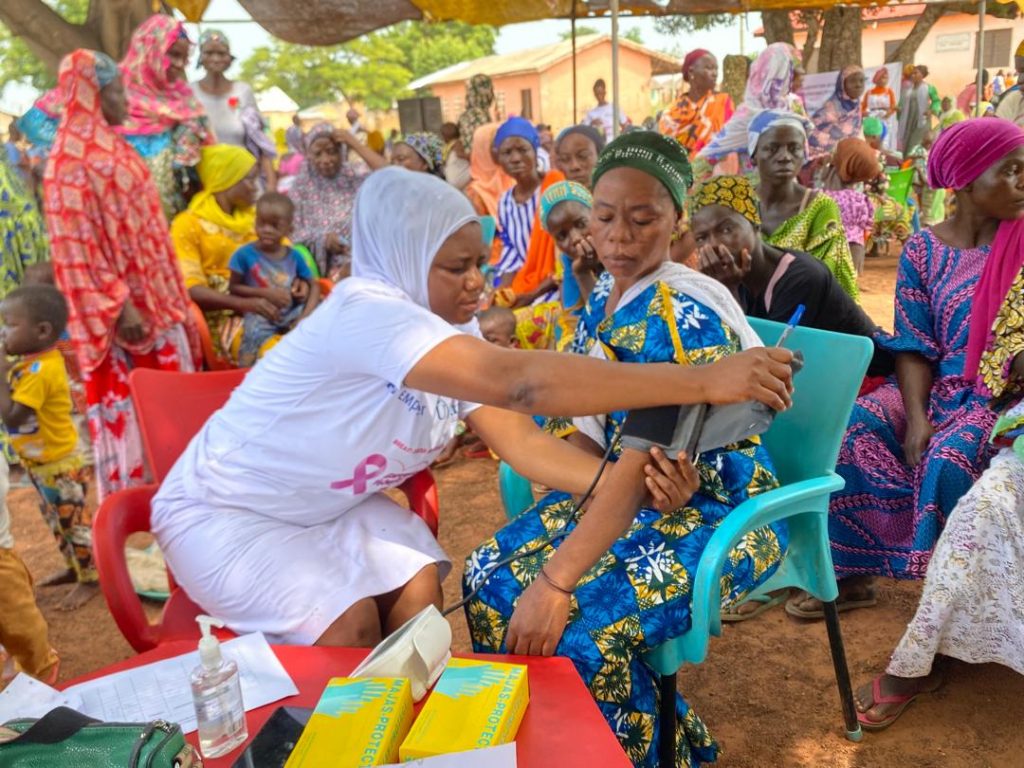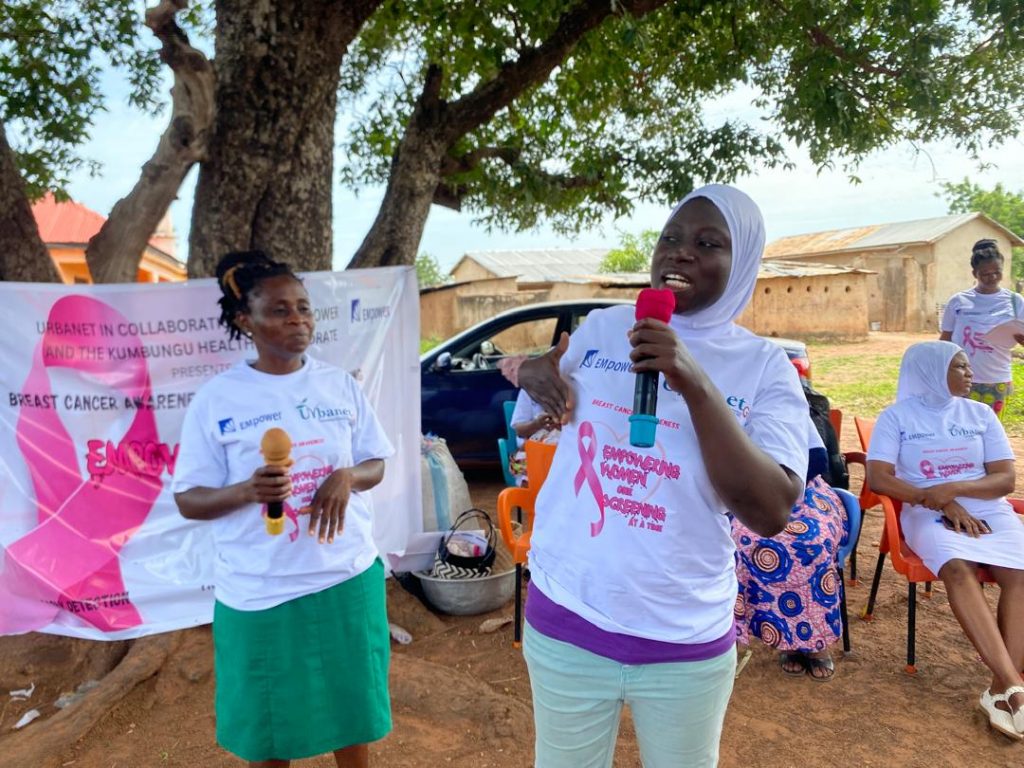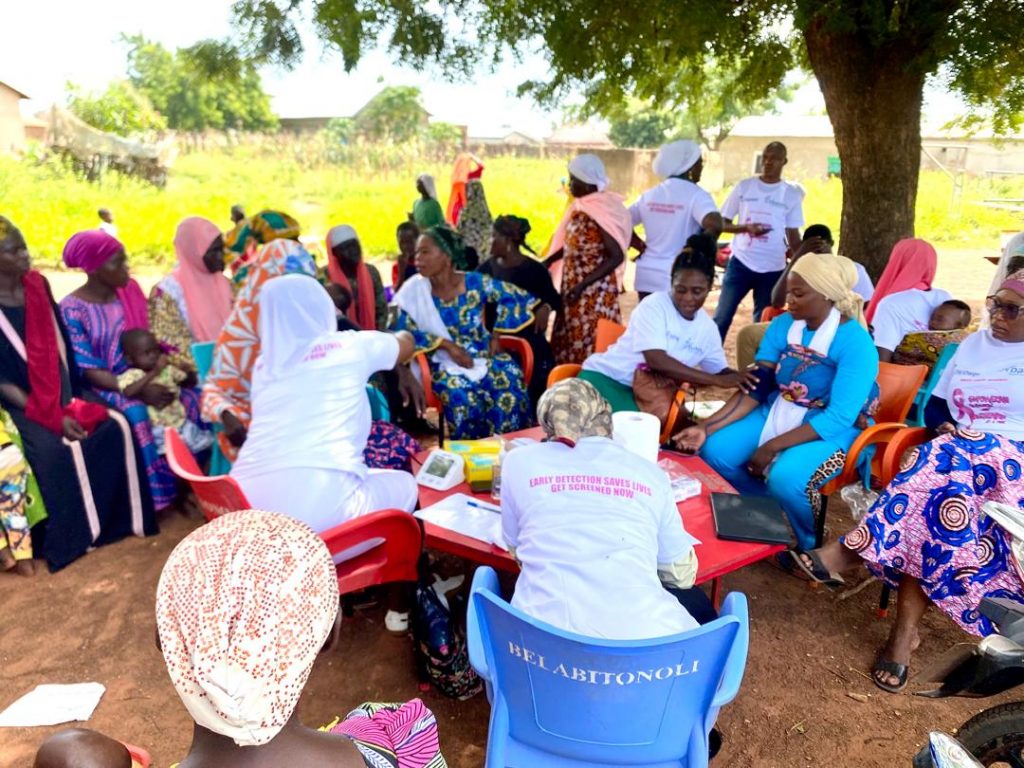Breast cancer is a leading cause of death among women in both urban and rural areas, with an exceptionally higher impact on rural women. Studies have shown that most women diagnosed with breast cancer are often in the advanced stages of the disease. Unfortunately, breast cancer awareness campaigns tend to focus on elite areas and social media, leaving many rural women uninformed. While some rural women may have an essential awareness of breast cancer, they often lack an understanding of its severity and the potential impact on their health.
URBANET held a breast cancer education and screening activity in collaboration with the Kumbungu Health Directorate (KHD) in the Chanzegu community within the Kumbungu district. The event was organized in commemoration of breast cancer awareness month. Over 200 women from the age of puberty to the older generation from three communities have benefited from this initiative. With two other communities, Chanzegu, one of URBANET’s operational communities, hosted the event. The event had two parts: the EDUCATION and SCREENING SESSION.


- SCREENING SESSION
Another major aspect of the event was the screening session by the health personnel. The screening entailed taking participants’ vitals, which included blood pressure (BP) and glucose levels, which were recorded by supporting staff.
- PARTICIPANTS’ VITAL RECORDS
This was done as part of the process to determine existing issues of high blood pressure and glucose levels of participants. To nurses and our relief, only a few participants recorded high blood pressure and none had an abnormal figure of glucose/blood sugar level. the few that recorded high BPs were investigated to determine if they had a history of high BP and whether they were on any sort of medication. They were further counselled on how to manage their BP and the need to frequent their health centres for medical check-ups once in a while. Some relatives of older participants (aged women) were spoken to by the nurses and advised to keep a constant check on them to be up to date with their BP statuses.
- EDUCATION/AWARENESS SESSION
Led by the URBANET team, and with the support of five health professionals provided by the KHD, the participants have been introduced to the issues of breast cancer, dangers and risk factors, especially for women in rural settings. Information that was shared with the women included but was not limited to;
- The Breast Cancer Awareness Month and its purpose
- What breast cancer is
- Causes
- Effects
- Symptoms
- Preventive measures
- Treatments
- Professional and self-examination
Through the education session, the women have learned most of the issues surrounding breast cancer. They are also taught the method of self-examination they can perform on their own in the comfort of their homes. Through this session, participants are encouraged to share the knowledge learned with their families and spouses and also to perform self-examination at least once every month. A few women were allowed to demonstrate breast self-examination to ensure a proper understanding of the concept. Others shared incidents of suspected breast cancer cases they have witnessed, with one incident leading to a loss of life.
Still, on the issue of women-related cancers, the health personnel took the initiative to educate them on cervical cancer, as it is part of the cancers that cause deaths in many women across the globe.

- BREAST SCREENING
Thanks to our lead contact person for this event, we were able to secure a room to be used for the breast screening to ensure the privacy of the women. A medical bed and screens were provided by the KHD to aid the smooth screening process, and a makeshift bed was provided by the contact person. Participants were screened by our health professionals who patiently answered their questions as they screened them.
During the breast screening process, we recorded 9 participants who had some symptoms that raised concerns among the nurses. These women were counselled and advised to visit the Tamale Teaching Hospital for further tests and investigation. However, their contact details were taken to engage them after the event to ensure they took action.
This initiative by URBANET is one of the steps taken to ensure proper health awareness within rural areas. With support from government health directorates, we intend to implement similar activities annually on different health issues, not just breast cancer. We are bridging the health gap and promoting inclusive health care for rural folks across the region.
